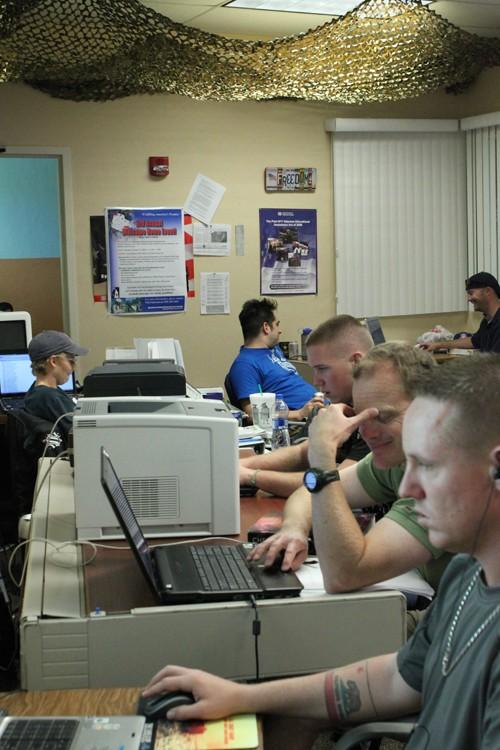Pins mark a map on the wall of The Veterans Education and Transition Services office where the UA’s student veterans have been deployed. Some students sit at computers, discussing homework. Others talk and laugh while they eat lunch. The office is a gathering place and numerous resources for student veterans.
“”We try to make the transition as painless and helpful as possible,”” said Matt Randle, student director for the VETS office and a family studies and human development junior. He served as a medic in the Army in Korea and Iraq. He compared the VETS office to other minority offices on campus.
“”Everybody should have a place like that,”” he said.
Randle said the military spends months training people to join the military but only a few days — if that — training them to return to civilian life.
The first VETS office opened in Old Main 208C last year. At that time, Randle said about five veterans per week would use the office. By the end of last academic year, about 50 veterans per week were using the office. Now, about 50 veterans per day visit the new office, which is located on the southwest side of the Student Union in room 404-0.
“”It’s kind of like a hub for anything that’s veteran-related,”” said Daniel Standage, coordinator for the Veterans Reintegration and Education Project. He graduated in 2009 with a degree in rehabilitation. He served in the U.S. Marine Corps from August 1991 to September 2001. There are approximately 600 veterans on the UA campus who are certified to use the GI Bill, Standage said. However, they estimate the veteran population to be higher.
The VETS office provides veterans with a place to do homework or get to know other veterans.
“”School is as much a social experience as an academic,”” Randle said. “”It’s hard to invest in something you don’t feel part of,”” he said.
Veterans staff the office, which allows the students to advise one another and talk about their shared experiences.
“”It’s a palpable feeling,”” he said. “”Much like our time in the military, we will not leave each other behind,”” said Randle.
Aaron Simmons, a microbiology senior, served as a field medic technician in the Navy from January 2002 to August 2007. He served in Japan, Iraq, and was Camp Pendleton, California. He said he spends time in the VETS office between most of his classes to get homework done.
“”Trying to get reestablished to the class lifestyle was a night and day difference,”” he said. He attended a community college before serving in the military. “”Coming back was an entirely different atmosphere,”” he said.
Simmons said he faced a generation gap between himself and other students.
“”It made it difficult to fit in,”” he said. Simmons also called the shift from the working mindset to the school mindset “”tiresome.””
Simmons said the VETS office provides a place for veterans to find camaraderie and help with homework.
“”Every semester it gets easier and more manageable,”” he said.
Amy Frame, a nutritional science senior, served as a corpsman in the Navy from January 1993 to August 1999. She now works in the VETS office providing students with information. She said it was difficult to transition because of the size of the university and it’s different approach.
“”Military school is different because it’s so structured,”” she said.
She added some veterans have different priorities, such as jobs and families.
“”This isn’t just their sole focus,”” Frame said.
The VETS office is a fun place to relax and make friends, Frame said.
“”You have a lot in common before you even know each other,”” she said.
Standage and Randle described the other veteran’s services as spokes on the VETS office wheel. The Office of the Registrar includes the Veterans’ Services office, which helps veterans register for the appropriate classes and receive the proper benefits.
The University Teaching Center offers transitional classes called Supportive Education for the Returning Veteran. This series of three classes, which each includes 20 students, counts towards general education and upper division electives. There is a resiliency class, a teaching to learn class and a leadership class.
“”The significance of those classes is they allow the guys and gals to know other veterans on campus and learn in an environment they’re used to in the military,”” Standage said. “”For one it gives them some identity.””
Veterans can also take advantage Student Veterans for America club, which allows students to become a part of something that is not directly tied to the university. The club is involved in playing intramural sports, volunteering, and coordinating events.
The Disability Resource Center also provides resources to veterans.
Amanda Kraus is the project director for the Disabled Veteran Reintegration and Education Project. The project is funded by a federal congressionally-directed grant.
They held a round table from Sept. 22-25 to reconceptualize the transition process for veterans. About 25 different organizations were represented.
The goal of the research project is to find out how veterans can successfully transition to a university so that the process can be replicated.
“”It is very rare they will follow a traditional path to college,”” Kraus said. “”They have different life and work experiences.””
She said the veteran population is increasing due to the Post 9/11 GI Bill and more people returning from the Middle East.
“”I think we recognize the service and all the work and commitment vets have shown,”” she said. “”We want to make this a vet-friendly campus.””
“”Now that we know vets will be attending in high numbers, we need to be prepared to help them be successful,”” she said.









